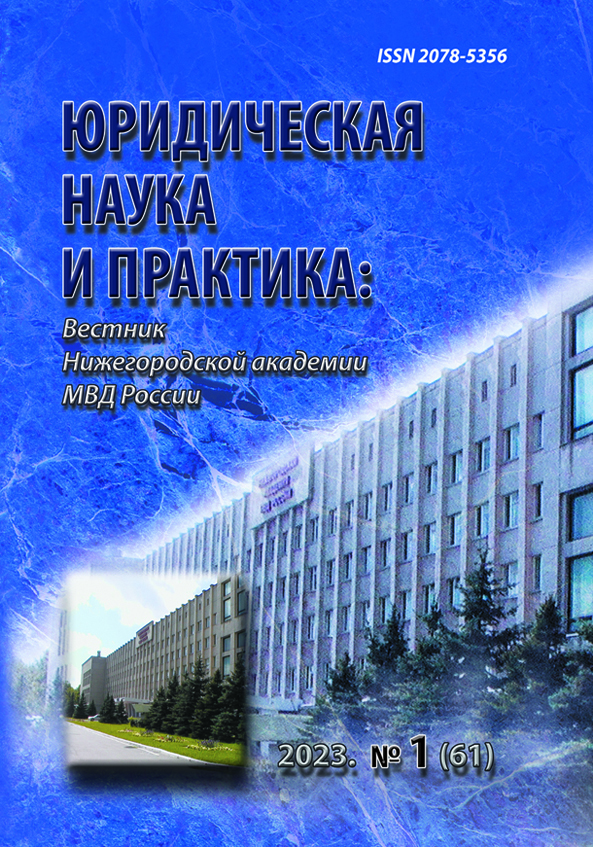Russian Federation
Between modern humanities, as is known, there is a close relationship. Often the same phenomenon is simultaneously in the field of view of representatives of several fields of knowledge. In this regard, in some cases, legal scholars, before considering specific state-legal problems, it makes sense to turn to the achievements of philosophy, political science, economic theory and other sciences. The information gleaned from them can become an important part of the methodological basis for conducting serious and in-depth legal research in the future. Based on this, the author of this article made an attempt to refer to the provisions of the sociology of law, reflecting the nature of compromise as a complex social phenomenon. With their help, he tried to clarify the reasons and trace the process of its penetration into the legal sphere. The material presented in the article seems to be able to expand the ideas of modern legal scholars about the nature of legal compromise and act as a foundation for its further study.
legal compromise, compromise, concept of compromise, sociology, sociology of law, regulation of social relations, stability of the social system, interests, conflict, clash of interests, balance of interests
1. Abercrombie N. Sociological Dictionary: transl. from English / ed. by S. A. Erofeeva. 2nd edition, revised and expanded. Moscow: Economics Publ., 2004. (In Russ.)
2. Bachinin V. A. Encyclopedia of Philosophy and Sociology of Law. St. Petersburg: Legal Center Press Publ., 2006. (In Russ.)
3. TSB. 2nd edition. Moscow: BSE Publ., 1957. Vol. 40. (In Russ.)
4. Weber M. The meaning of “freedom from evaluationˮ in sociological and economic science. Selected Works: transl. comp., total. ed. by Yu. N. Davydov; foreword P. P. Gaidenko. Moscow: Progress Publ., 1990. (In Russ.)
5. Weber M. On some categories of understanding sociology: Selected Works: transl. / comp., total. ed. by Yu. N. Davydov; foreword P. P. Gaidenko. Moscow: Progress Publ., 1990. (In Russ.)
6. Jerry D. Big explanatory sociological dictionary. Vol. 2. Moscow: Veche Publ., 1999. (In Russ.)
7. Durkheim E. On the division of social labor. Method of sociology / transl. from French and an afterword by L. B. Hoffmann. Moscow: Nauka Publ., 1990. (In Russ.)
8. Kuznetsov V. N. The theory of compromise. Moscow: Book and business Publ., 2010. (In Russ.)
9. Law and law enforcement in the mirror of social sciences: Reader of modern texts / scientific ed. by E. L. Paneyakh; lit. ed. by A. M. Kadnikova. Moscow: Statute Publ., 2014. (In Russ.)
10. Petruchenko F. Latin-Russian Dictionary. Moscow: V. V. Dumnov, Nasledniki Br. Salaev Publ., 1914. (In Russ.)
11. Modern philosophical dictionary / ed. by V. E. Kemerova. 2nd edition, revised and expanded. London; Frankfurt am Main; Paris; Luxembourg; Moscow; Minsk: Panprint Publ., 1998. (In Russ.)
12. Philosophical encyclopedic dictionary. Moscow: Soviet encyclopedia Publ., 1983. (In Russ.)
13. Philosophical Dictionary: Founded by G. Schmidt / gen. ed. by V. A. Malinin. 22nd edition. Moscow: Respublika Publ., 2003. (In Russ.)
14. Erlich O. Fundamentals of sociology of law / transl. by M. V. Antonova; ed. by V. G. Grafsky, Yu. I. Grevtsov. St. Petersburg: University Consortium Publ., 2011. (In Russ.)
15. Legal encyclopedia / ed. by B. N. Topornin. Moscow: Jurist Publ., 2001. (In Russ.)












